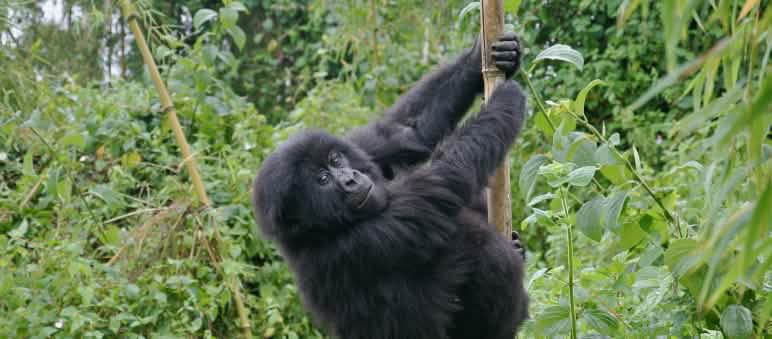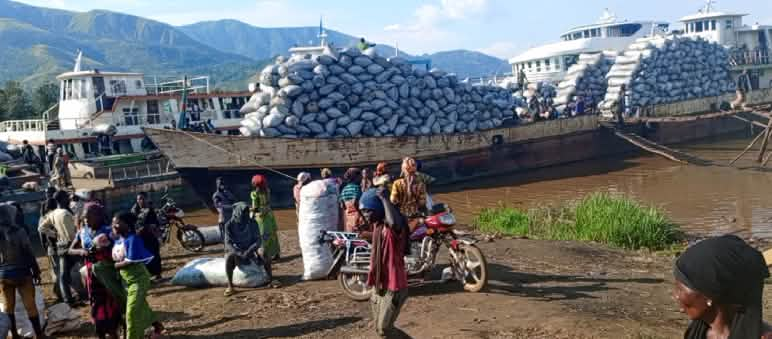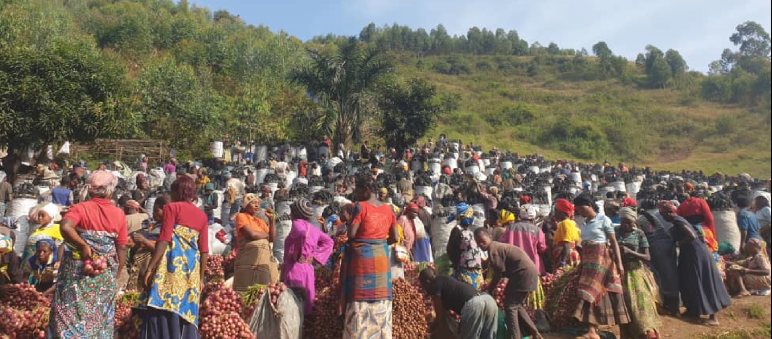Stop the spiral of violence, resource plundering and environmental destruction!
Democratic Republic of the Congo: One year ago, we launched the petition “DRC: People and nature in eastern Congo need peace.” Since then, conditions in the DRC have worsened sharply. This is a catastrophe for hundreds of thousands of people. The environment is suffering as well: environmental defenders are able to work only under strict limitations, while militias and organized criminals are free to plunder nature.
In places plagued by violence, disorder, and hardship, nature is especially at risk. In the Democratic Republic of the Congo, its rich biodiversity and the appeal of highly profitable resources further heighten the danger.
Since the rebel army M23 seized large parts of North and South Kivu provinces, vast forest areas have been destroyed. In the case of Kahuzi-Biega National Park (PNKB), satellite images from the European Earth observation program Copernicus, taken in January and July 2025, show the damage clearly. Areas once covered with lush primary forest now display barren patches. The images can be seen on Mongabay.
Pillage of nature by rebels, militias, and criminals
We asked conservationists and human rights defenders for their assessment of recent developments. We are keeping their names confidential for security reasons. The UN paints a grim picture of the human rights and security situation.
This situation exposes environmental defenders to immediate and increased risks: arbitrary arrests, threats, intimidation, and physical violence.
One of our partners reports that their scope for action has narrowed sharply. Several initiatives to protect biodiversity have had to be suspended or postponed because of funding shortages or the unstable security situation.
Where possible, work nevertheless continues. In some areas, eco-guards still patrol, though less frequently. Agroforestry projects and programs to strengthen alternative livelihoods are ongoing.
If nothing is done, Kahuzi-Biega National Park, a UNESCO World Heritage Site, will soon disappear.
Where the state and its institutions are weak, the illegal exploitation of natural resources escalates.
The exploitation of Kahuzi-Biega and Virunga National Parks has intensified with the rise of the M23 rebels, as existing networks of illegal actors have grown even larger.
This comes from an internationally recognized expert who has gone into hiding after several assassination attempts. He describes a “division of labor” between pro-government Wazalendo militias operating inside Kahuzi-Biega National Park (PNKB) and M23 rebels who mainly control areas outside the park: The Wazalendo are said to oversee the park’s exploitation through logging and other means, while M23 profits from the trade in products like charcoal in Bukavu and Goma.
Hundreds of thousands of people have fled the fighting to these two cities, and many of them rely on charcoal and firewood for cooking. “Without this market, the large-scale loss of vegetation we are seeing now would not have happened.”
Other sources describe how the territories of M23 on one side and the army and Wazalendo on the other are constantly shifting and cannot be clearly delineated. The conflict parties reportedly profit primarily from “fees” collected at roadblocks along trade routes and “tolls” tied to the exploitation of protected areas.
In Bukavu, there is reportedly such a glut of charcoal that the price per sack, once 80 US dollars, has temporarily fallen to 15 dollars. In Murhesa, along the Miti–Bukavu highway, a new charcoal market has emerged. Photos show numerous white sacks typically used to transport the fuel.
The PNKB’s natural resources are being destroyed. This is truly alarming: Large trees with diameters of one to two meters are being cut down with chainsaws to produce charcoal.
Mining is also expanding within the PNKB. Local sources report that traders from Bukavu are bringing in equipment to search for gold and other minerals. Gold and cassiterite are being extracted along several rivers and transported through Bukavu to Rwanda.
As for poaching: Wazalendo who enter the park have no food sources other than what they find there. We fear that biodiversity in this part of the park will be completely lost,” warns an expert.
Environmental defenders in the DRC – working with great dedication and at considerable risk, within the limits of what is possible – continue their efforts. Every day we ask ourselves: how can we support them from afar and help safeguard nature?
Petitions raise awareness and build political pressure
Over the past 13 months, Rainforest Rescue has launched three petitions, each highlighting the same tragedy – the violence in eastern DRC and its devastating consequences for people and nature. Each petition focuses on a different aspect: from the political call for peace, to protecting individual activists, to criticizing the economic roots of violence and the responsibility of the Global North.
With the petition DRC: People and nature in eastern Congo need peace, we warn that without an end to violence, neither security for local communities nor protection for forests will be possible.
Eastern Congo needs security and peace. Without them, respect for human rights and protection of nature will remain elusive.
We have addressed this appeal to DRC President Felix Tshisekedi and representatives of the UN and EU. So far, 53,563 supporters have signed this petition.
In the petition DRC: Stop harassing Congo's environmental defenders, we emphasized that environmental and human rights defenders in the Congo face growing threats. Our main demand to the government in Kinshasa is:
End the persecution, arrest, intimidation, and harassment of forest and human rights activists. Strengthen environmental protection.
Because the DRC depends on international aid, we are cc'ing international donors to the Central African Forest Initiative (CAFI) and the German government. So far, we have collected 64,909 signatures for this campaign.
The third petition focuses on one of the main drivers of the conflict: DRC: Europe’s green transition must not cost Congo’s blood and forests. Our central demand is directed at the EU and its member states:
Rwanda shares responsibility for violence and environmental destruction in Congo–Kinshasa. The EU must end its partnership on critical raw materials.
This petition highlights the link between the systematic plundering of resources such as gold and coltan, the financing of militias, and EU raw materials policy. Those who buy resources from the Congo or Rwanda share responsibility for war and destruction. To date, the petition has been signed 55,534 times.
Together, the three petitions form an urgent appeal:
Stop the spiral of violence, resource plunder, and environmental destruction – for the people and forests of the Congo.
We have collected a total of 174,000 signatures for the people of the Congo. Please add yours if you haven’t already. We plan to submit the three petitions as a package to governments, the EU, and the UN.
Eastern lowland gorillas (Gorilla beringei graueri) live in Kahuzi-Biega National Park, while mountain gorillas (Gorilla beringei beringei) inhabit Virunga National Park. In times of peace, tourists can view gorillas on guided tours. Both parks have long been on UNESCO’s list of “World Heritage in Danger” – partly because of the threat of oil exploration and ongoing violence.


